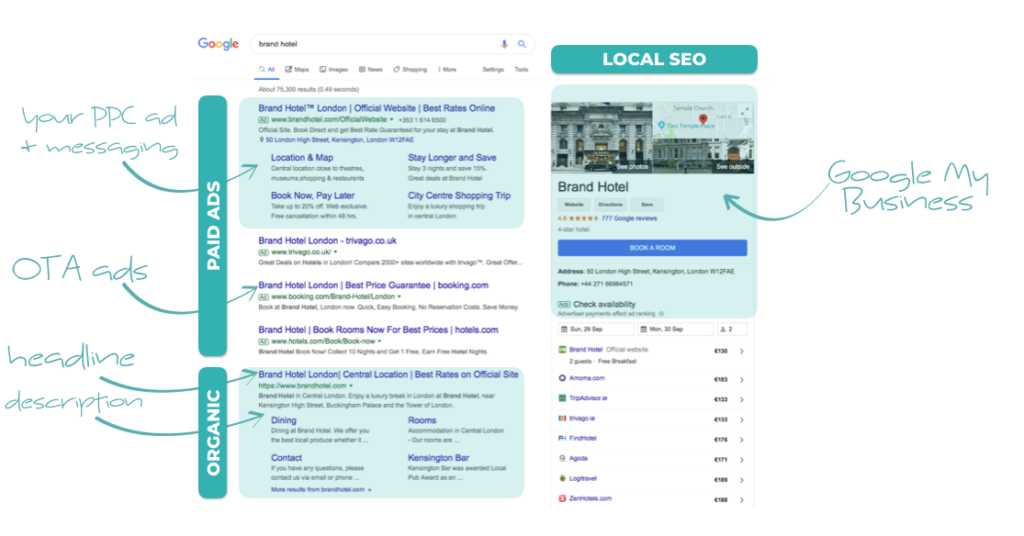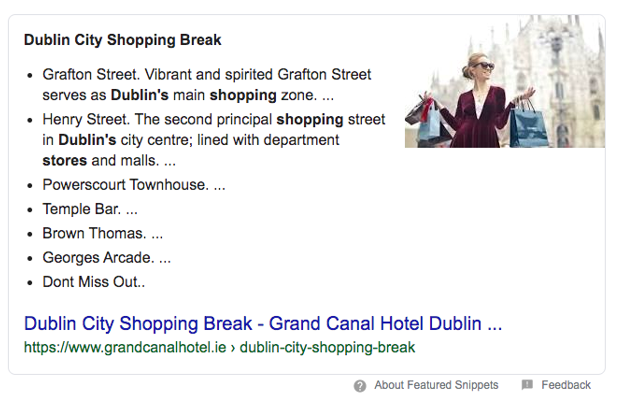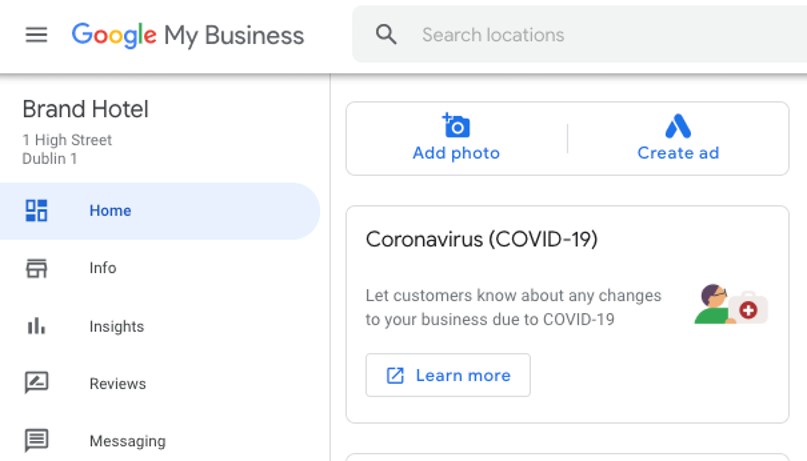
Many businesses and individuals are struggling to cope during the current crisis, but many are also looking for ways to maximise their available time.
NB: This is an article from Bookassist
While normal marketing activities have been curtailed, there are still plenty of actions that hotels can take in order to prepare for recovery and to ensure that they are in a position to get a strong headstart when demand starts to improve.
We have looked at the various elements of search below and outlined what you should be doing to get ahead of the game now.

PPC Advertising – Don’t Hand The Recovery To OTAs
The natural reaction during a crisis like this is to pull back on all marketing investment while waiting to see how things develop. While this may produce a small saving in the short term, it will have negative impacts in the long term and will slow down the return to success when business picks up again. Remember, PPC ads will only appear when relevant searches are being made, so it makes sense to at least protect your brand.
People are still hoping to travel in a few months time, so direct booking should remain the main focus for attracting those users. OTAs are continuing to bid on hotel brand names, so by pausing brand advertising, hotels are losing out on lower-cost bookings in the future and handing the recovery to OTAs. Do not let that happen..
Another advantage of continuing PPC ads is that the ad’s text can be instantly updated which allows you to frequently change your message to customers when they search for your brand. You could highlight your in-house Covid-19 preparations, your advance purchase offer, cancellation policies etc, to highlight to guests that they can book for the future with confidence.
On a more technical note, the use of Google’s AI and Smart Bidding technology (as used by Bookassist) allows your campaigns to be optimised in real time based on user interactions, history, the likelihood of conversion and other parameters. These systems rely on a steady flow of data such as clicks and conversions. By switching off this flow of data, the campaigns may be compromised when restarted and take some time to get back to the fully optimised state they enjoyed before being paused. You will lose your advantage coming out of the blocks on recovery.
Our advice is to reduce spend on prospecting marketing campaigns and display campaigns but to continue with brand protection and remarketing. Other campaigns with a long lead-in time, eg Wedding or Conferencing enquiries should also be kept active at a low level. This is also a good opportunity to prepare and plan new marketing campaign types such as YouTube and Display ads, if you haven’t used them in the past.
On-Site SEO
Whether you are running PPC campaigns or not, investing time in your SEO strategy will have both short term and long term benefits. Simple things like updating your home page meta-tags and titles will allow you to craft a specific message to users who are searching for your brand or services.
Although the changes are not as instantly visible as with PPC ads, they will happen reasonably quickly and allow you to keep customers up to date with your latest status. Our digital marketing team will be working closely with clients in the coming weeks to review and update their page titles and ensure that the right message is being sent.
In addition to looking at titles and tags, we will also be looking at page content among other areas. This is an opportunity for us and our clients to reassess our focus and decide what content needs work and where improvements can be made.

Recent changes to the search results page mean that there are new opportunities to rank well, with ‘Featured Snippets’ being of particular interest (see figure 2). There are a number of ways to increase the chances of appearing as a featured snippet, so we will be examining these and suggesting ways to improve, by applying the below techniques to relevant pages:
- Answer queries – who, what, how etc
- Apply bullet points, tables, paragraphs
- Use Structured Data (schema.org)
- Use correct heading formats
- Research queries – use ‘People also ask’ feature to come up with content ideas
An additional benefit of appearing as a ‘Featured Snippet’ is that this content is frequently used as a result for voice search queries, so your website name and content could be returned as a voice answer in a query such as in the example in Figure 2.
Local SEO
The discipline of Local SEO has become increasingly important in recent years, and if it is not something you are familiar with, then now is a good opportunity to learn more. A good place to start is our overview article on Local SEO. We will be working with clients to ensure that their Local SEO is fully optimised, starting with their Google My Business listing. This listing is particularly important as it forms a core element of the content in the Knowledge Graph on the right-hand side of the search results page. We will also be looking at other platforms such as Apple Maps and Bing Places for business in relevant markets.
If you have not worked in Google my Business before, then the first thing to do is to ensure that you have access to your property listing at https://business.google.com/. Once there you can see insights into how your property is performing, add photos, respond to reviews and questions, set up direct messaging from customers on mobile, and add details such as facilities, services and opening hours etc. This is particularly useful in the current circumstances, so customers can see your status instantly on the search page. For non-hotel businesses such as restaurants, there is also a facility to update your listing with a post – a small area on the page with a message and image where you can update customers with your latest status. For example, restaurants that are closed but available for takeaway can add details on a post so customers are aware of this option.
Google is actively trying to help businesses with ideas and useful links, so keep an eye out for suggestions such as in figure 3 below:

Metasearch Campaigns
Although demand has fallen, there is still plenty to do in order to improve future performance:
Travelers are currently showing less inclination to book your hotel due to the general situation and uncertainty,but they will soon want to start planning their next stay again. So now is the right time to work more intensively on your hotel brand so that you are ready as soon as everyone wants to actively plan their trips again.
Strengthening your online brand on Metasearch is now more than ever becoming a strategy to follow to gain a competitive advantage when the situation finally returns to normal. With this in mind, we have prepared a strategic and operational plan which aims to optimize the brand of your hotel on Metasearch and which we will continue to implement in the coming weeks.
Our Metasearch team are liaising with clients on their detailed action plan to optimise the following areas:
1. Your Hotel Brand Identity on Metasearch
Revision of your hotel profile, content and basic information to ensure maximum accuracy and consistency in all major metasearch platforms in terms of:
- Revision of information such as hotel name, address, postal code, contact details;
- Positioning of the hotel on the map (geolocation)
- Main profile photo and photo gallery
- Hotel description
- Hotel services
This analysis is performed on the main metasearch platforms: Google, Trivago, Tripadvisor, Kayak, Skyscanner, Wego, Bing.
2. Your Hotel Brand Image on Metasearch
Analysis of the current positioning of your hotel on Metasearch platforms in relation to:
- Ranking
- Reputation
- Reviews
- Traffic Share (official website vs. OTAs)
- Booking Share (official website vs. OTAs)
This analysis is performed on the most important metasearch platforms: Google, Trivago, Tripadvisor, Kayak, Skyscanner, Wego, Bing.
3. Your Hotel vs your Competitors on Metasearch
In-depth analysis of the image and positioning of your hotel compared to the competing hotels on the main Metasearch platforms, in order to determine which areas need to be improved in order to stand out from the competition and which areas need to be consolidated in order to maintain the current competitive advantage.
Also in terms of rank, reputation and brand image.
The result of the analysis will be a “Metasearch Audit” which will assess the level of your hotel in terms of positioning and optimization on Metasearch and will make suggestions for measures to maintain/improve the visibility of your hotel. The proposed measures are then implemented and/or coordinated by your Metasearch specialist as part of the Metasearch service.
Action Plan Summary
The key thing to remember is that this situation will eventually end, so we all need to plan ahead for recovery not just sit back and wait. A shift in focus from day-to-day marketing activities toward preparation and house-keeping is vital to ensure that you are ahead of the game when the recovery starts. Actions we strongly recommend now include:
- Maintain PPC investment at a lower level to protect your brand and connect with future customers
- Refresh website content, titles, tags and structure to improve ranking and traffic
- Familiarise yourself with elements of Local SEO, such as Google My Business
- Work with our Metasearch team to optimise your account
- Investigate and plan ahead for new platforms and strategies such as YouTube ads and Display Advertising




